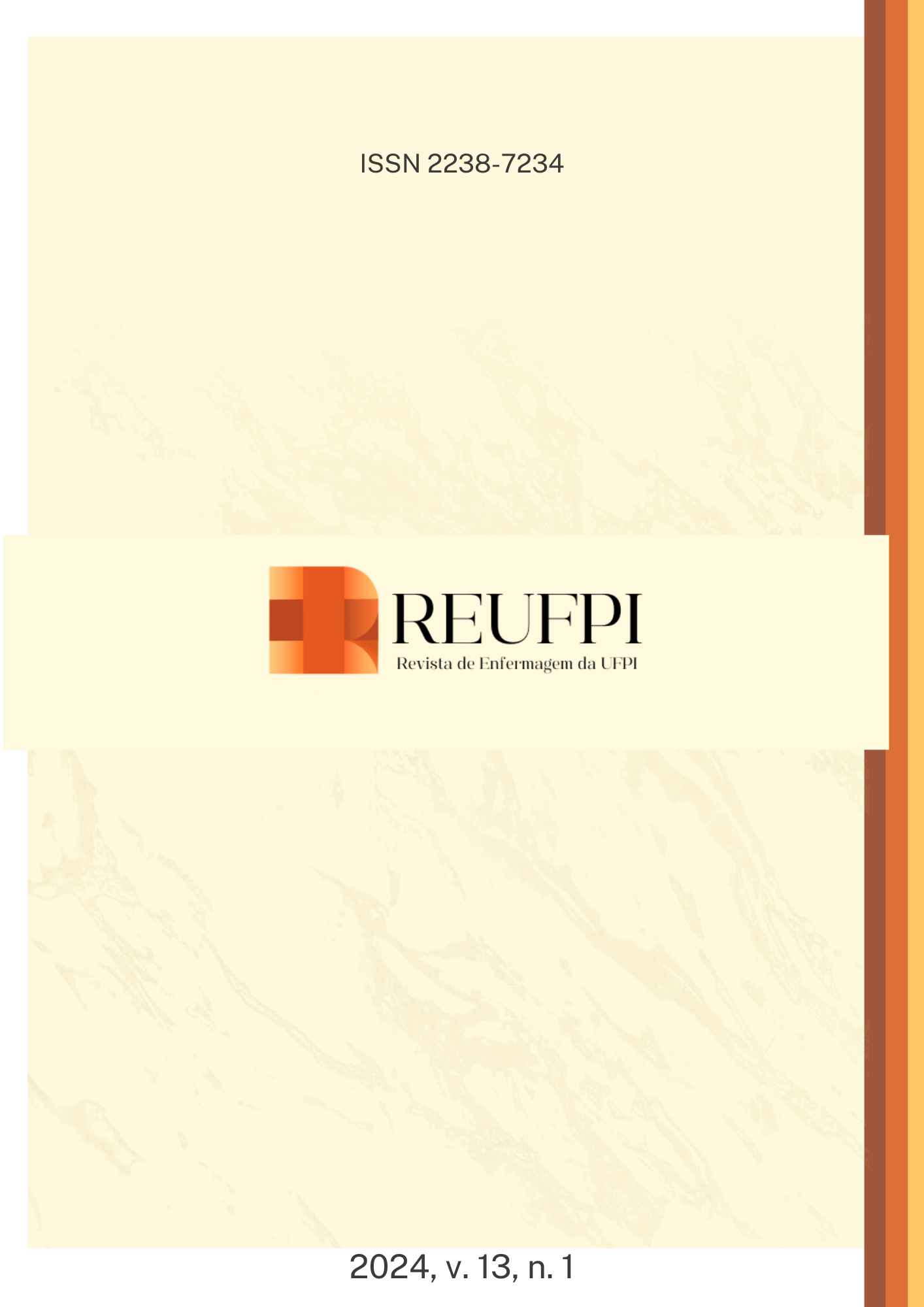Obstetric violence as perceived by nursing students
DOI:
https://doi.org/10.26694/reufpi.v13i1.3819Palavras-chave:
Knowledge, Students, Nursing, Obstetric Violence, Women's HealthResumo
Objective: To identify the perception of Nursing students about the understanding, causes, and prevention actions of obstetric violence. Method: A descriptive, exploratory, and qualitative study carried out at a private university center in Paraná. The data was collected from June to July 2022, using a semi-structured questionnaire for 10 Nursing students and submitted to thematic content analysis. Results: The following category emerged: knowledge of Nursing students about obstetric violence, made up of two subcategories: obstetric violence: concept, types, and understanding of the causes in the perception of Nursing students; and empowerment of women, active listening and training of health professionals to prevent practices that constitute obstetric violence. According to the interviewees, obstetric violence is characterized by abuse and mistreatment by health professionals, in its physical, verbal, moral, psychological, and sexual forms. Professional and structural issues were identified as the main causes, while professional training and women's empowerment were identified as factors for preventing the problem. Final considerations: The students understood the practices characterized as obstetric violence, were familiar with their main causes, and pointed to professional training and the need to provide women with preventive actions against this type of violence in obstetric services.
Referências
Kappaun A, Costa MMM. A institucionalização do parto e suas contribuições na violência obstétrica. Rev. Paradig. [Internet]. 2020;20(1):71-86. Available from: https://revistas.unaerp.br/paradigma/article/view/1446/1544.
Marques SB. Violência obstétrica no Brasil: um conceito em construção para a garantia do direito integral à saúde das mulheres. Cad. Ibero Am. Direito Sanit. [Internet], 2020;9(1):97-119. doi: https://doi.org/10.17566/ciads.v9i1.585.
Marinho K. Você sabe o que é Violência Obstétrica? [Internet]. 2020 [citado 4 Mai 2022]. Available from: https://www.saopaulo.sp.leg.br/mulheres/voce-sabe-o-que-e-violencia-obstetrica/.
Mihret MS. Obstetric violence and its associated factors among postpartum women in a Specialized Comprehensive Hospital, Amhara Region, Northwest Ethiopia. BMS Res. Notes. [Internet]. 2019; 12(600:1-7. doi: https://doi.org/10.1186/s13104-019-4614-4.
Bohren MA, Mehrtash H, Fawole B, Maung TM, Balde MD, Maya E, et al. How women are treated during facility-based childbirth in four countries: a cross-sectional study with labour observations and community-based surveys. Lancet. [Internet]. 2019; 394(10210): 1750-63. doi: https://doi.org/10.1016/S0140-6736(19)31992-0.
Martínez-Galiano JM, Martinez-Vazquez S, Rodríguez-Almagro J, Hernández-Martinez A. The magnitude of the problem of obstetric violence and its associated factors: A cross-sectional study. Women Birth. [Internet]. 2021;34(5):e526-e536. doi: https://doi.org/10.1016/j.wombi.2020.10.002.
Castro R, Frías SM. Obstetric Violence in Mexico: Results From a 2016 National Household Survey. Violence Against Women. [Internet]. 2020;26(6-7):555-72. doi: https://doi.org/10.1177/1077801219836732.
Leite TH, Pereira APE, Leal MC, Silva AAM. Disrespect and abuse towards women during childbirth and postpartum depression: findings from Birth in Brazil Study J. affect. disord. [Internet]. 2020; 273: 391-401. doi: https://doi.org/10.1016/j.jad.2020.04.052.
Katz L, Amorim MM, Giordano JC, Bastos MH, Brilhante AVM. Who is afraid of obstetric violence? Rev. Bras. Saude Mater. Infant. [Internet]. 2020;20(2):623-26. doi: https://doi.org/10.1590/1806-93042020000200017.
Lansky S, Souza KV, Peixoto ERM, Oliveira BJ, Diniz CSG, Vieira NF, et al. Obstetric violence: influences of the Senses of Birth exhibition in pregnant women childbirth experience. Ciênc. Saúde Colet. [Internet]. 2019; 24(8):2811-23. doi: https://doi.org/110.1590/1413-81232018248.30102017.
Ramos TM, Tanaka EZ, Carmona EV, Sanfelice CFO. Nursing students’ knowledge about obstetric violence. ABCS Health Sci. [Internet]. 2022;47:e02222. doi: https://doi.org/10.7322/abcshs.2020163.1606.
Bardin L. Análise de conteúdo. São Paulo: Edição 70; 2011.
Melo KASR, Almeida EA, Peixoto VS. Violência obstétrica: a percepção de acadêmicos de enfermagem de uma faculdade do sudoeste goiano. Res. Soc. Dev. [Internet]. 2022; 11(13): e59111324449. doi: https://doi.org/10.33448/rsd-v11i13.24449.
Vieira SN, Vidigal BAA, Sousa AM, Reis LN, Teixeira E, Vasconcelos MNG. Violência obstétrica: convergências e divergências entre acadêmicos de enfermagem e medicina. Enferm. Foco. [Internet]; 2019; 10(6):21-8. doi: https://doi.org/10.21675/2357-707X.2019.v10.n6.2068.
Mena-Tudela D, Cervera-Gasch Á, Andreu-Pejó L, Alemany-Anchel MJ, Valero-Chillerón MJ, Peris-Ferrando E, et al. Perception of obstetric violence in a sample of Spanish health sciences students: A cross-sectional study. Nurse educ. today. [Internet]. 2022; 110: 105266. doi: https://doi.org/10.1016/j.nedt.2022.105266.
Martins LF, Carvalho FLO, Costa DM, Paris LRP, Junior LRG, Bueno DMP, et al. Violência Obstétrica: Uma expressão nova para um problema histórico. Saúde Foco. [Internet]. 2019; 11:413-23. Available from: https://portal.unisepe.com.br/unifia/wp-content/uploads/sites/10001/2019/03/034_VIOL%C3%8ANCIA-OBST%C3%89TRICA-Uma-express%C3%A3o-nova-para-um-problema-hist%C3%B3rico.pdf.
Costa JA, Silveira JA, Gonçalves SJC, Souza MCA. Violência obstétrica e humanização no parto. Percepção de alunos de graduação em Medicina e Enfermagem. Rev Saúde. [Internet]. 2022; 13(1):28–33. doi: https://doi.org/10.21727/rs.v13i1.2993.
Oliveira TR, Costa REOL, Monte NL, Veras JMMF, Sá MIMR. Women's perception on obstetric violence. Rev enferm. UFPE on line. [Internet]. 2017; 11(1):40-6. doi: https://doi.org/10.5205/1981-8963-v11i1a11876p40-46-2017.
Souza TP, Santos MVA, Corgozinho VA, Oliveira MM, Almeida CS, Souza DAS. Pregnant women's empowerment against obstetric violence. Res. Soc. Dev. [Internet]. 2022; 11(6):e27611629100. doi: https://doi.org/10.33448/rsd-v11i6.29100.
Barros MNC, Moraes TL. Parto humanizado: uma perspectiva da política nacional de humanização. Rev Extensão. [Internet]. 2020; 4(1):84-92. Available from: https://revista.unitins.br/index.php/extensao/article/view/2038.
Cardoso FJC, Costa ACM, Almeida MM, Santos TS, Oliveira FBM. Institutional obstetric violence in birth: perception of health professionals. Rev enferm. UFPE on line. [Internet]. 2017; 11(9): 3346-53. doi: https://doi.org/10.5205/reuol.11088-99027-5-ED.1109201704.
Faleiros MCPPN; Oliveira NHD. How precarious work conditions in health affect birth: an integrative review on obstetric violence. REFACS. [Internet]. 2019; 7(3):345-56. doi: https://doi.org/10.18554/refacs.v7i3.3757.
Ferreira SCS, Pantoja NKC, Silva LB, Torres ACP, Rocha ENP. Fatores que contribuem para a ocorrência da violência obstétrica no Brasil: revisão integrativa de literatura. REAS [Internet]. 2021;13(12): 1-11. doi: https://doi.org/10.25248/reas.e9512.2021.
Marinho AMP, Almeida FF, Martins IPR, Sales OP, Okabaiashi DCV. A prática da violência obstétrica e o papel do enfermeiro no empoderamento da mulher. Rev Multidebates. [Internet]. 2021; 5(2): 26-37. Available from: https://revista.faculdadeitop.edu.br/index.php/revista/article/view/370.
Downloads
Publicado
Como Citar
Edição
Seção
Licença
Copyright (c) 2024 Rev Enferm UFPI

Este trabalho está licenciado sob uma licença Creative Commons Attribution 4.0 International License.
Autores mantém os direitos autorais e concedem à REUFPI o direito de primeira publicação, com o trabalho licenciado sob a Licença Creative Commons Attibution BY 4.0 que permite o compartilhamento do trabalho com reconhecimento da autoria e publicação inicial nesta revista.

























